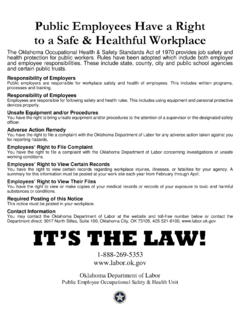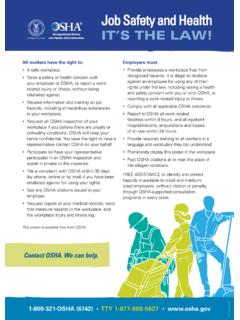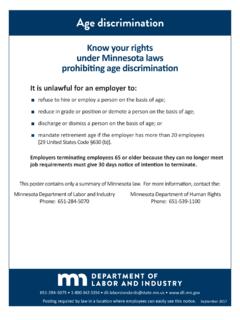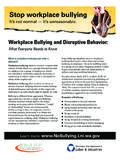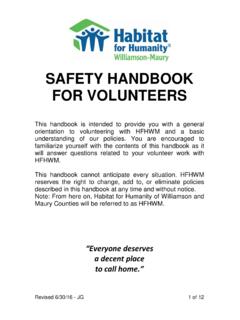Transcription of COMMON EMPLOYABILITY SKILLS - National Network
1 National Network OF BUSINESS AND INDUSTRY ASSOCIATIONSCOMMON EMPLOYABILITY SKILLSA Foundation for Success in the workplace :The SKILLS All Employees Need, No Matter Where They WorkPERSONAL SKILLSPEOPLE SKILLSAPPLIED KNOWLEDGEWORKPLACE SKILLSPERSONAL SKILLS Integrity Initiative Dependability & Reliability Adaptability ProfessionalismPEOPLE SKILLS Teamwork Communication RespectAPPLIED KNOWLEDGE Reading Writing Mathematics Science Technology Critical ThinkingWORKPLACE SKILLS Planning & Organizing Problem Solving Decision Making Business Fundamentals Customer Focus Working with Tools & TechnologyThese EMPLOYABILITY SKILLS are interconnected to allow employers to look at the full scope of what SKILLS are necessary in all major economic sectors. Together, attainment of these business-defined SKILLS prepares individuals for careers and for further education and National Network represents major business sectors and is funded through a collaborative partnership of Business Roundtable (BRT), ACT Foundation, The Joyce Foundation, Lumina Foundation and Walmart Foundation.
2 Members include leaders in the manufacturing, retail, health care, energy, construction, hospitality, transportation and information technology THE Network :AS OF MARCH, 2015 Today, employers in every industry sector emphasize the need for employees with certain foundational SKILLS . These include, a strong academic grounding in reading and math, as well as individual abilities such as teamwork, problem solving, work ethic and integrity. While employers rely on employees to have the same basic SKILLS , they do not always talk about or label them the same way. This makes it difficult for prospective employees and educators to know exactly what it takes to be ready to succeed in any career path in any industry. The National Network has brought together the organizations that represent employers from major economic sectors, and they have worked to identify the core set of fundamental SKILLS that potential employees need in the workplace and a COMMON vocabulary to explain them.
3 This model can take its place as the foundation for all industries to map skill requirements to credentials and to career paths. In doing so, this model allows employees to understand the SKILLS that all industries believe prepare individuals to succeed.* Educators and other learning providers will also have an industry-defined roadmap for what foundational SKILLS to teach, providing individuals the added benefit of being able to evaluate educational programs to ensure they will in fact learn SKILLS that employers SKILLS can be acquired in a variety of ways, including military service, work experiences and community service, as well as traditional education. A Cross-Industry Approach to Foundational SKILLS COMMON EMPLOYABILITY SKILLSINTEGRITY: Treating others with honesty, fairness and respect Demonstrate respect for company s time and property Accept responsibility for one s decisions and actionsINITIATIVE: Demonstrating a willingness to work and seek out new work challenges Take initiative in seeking out new responsibilities and work challenges, increasing the variety and scope of one s job Pursue work with energy, drive and effort to accomplish tasks Establish and maintain personally challenging, but realistic work goals Strive to exceed standards and expectationsDEPENDABILITY & RELIABILITY.
4 Displaying responsible behaviors at work Behave consistently, predictably and reliably Fulfill obligations, complete assignments and meet deadlines Follow written and verbal directions Comply with organization s rules, policies and procedures Demonstrate regular and punctual attendanceADAPTABILITY: Displaying the capability to adapt to new, different or changing requirements Be open to learning and considering new ways of doing things Actively seek out and carefully consider the merits of new approaches to work Embrace new approaches when appropriate and discard approaches that are no longer working Effectively change plans, goals, actions or priorities to deal with changing situationsPROFESSIONALISM: Maintaining a professional demeanor at work Demonstrate self-control by maintaining composure and keeping emotions in check even in difficult situations Maintain professional appearance by dressing appropriately for the job and maintaining personal hygiene Use professional language when speaking with supervisors, co-workers and customers Maintain a positive attitude Take ownership of one s work PERSONAL SKILLSTEAMWORK.
5 Demonstrating the ability to work effectively with others Establish a high degree of trust and credibility with others Interact professionally and respectfully with supervisors and co-workers Develop constructive working relationships and maintain them over time Use appropriate strategies and solutions for dealing with conflicts and differences to maintain a smooth workflowCOMMUNICATION: Maintaining open lines of communication with others Demonstrate sensitivity and empathy Listen to and consider others viewpoints Recognize and interpret the verbal and nonverbal behavior of others Speak clearly, in precise language and in a logical, organized and coherent mannerRESPECT: Working effectively with those who have diverse backgrounds Demonstrate sensitivity and respect for the opinions, perspectives, customs and individual differences of others Be flexible and open-minded when dealing with a wide range of people Value diversity of approaches and ideasPEOPLE SKILLSThe National Network has identified the COMMON EMPLOYABILITY SKILLS for all jobs, which benefit.
6 Employers, who can now identify the COMMON SKILLS that all their employees should exhibit Potential employees, who know what basic SKILLS employers expect them to have for any job in the workplace , and can better communicate their skill levels to employers Educators and other learning providers, who know what foundational SKILLS to emphasize* The competencies come from the existing Industry Competency Models, which were created and vetted by each of the industries READING: Understanding written sentences and paragraphs in work-related documents Read and comprehend work-related instructions and policies, memos, bulletins, notices, letters, policy manuals and governmental regulations Read and comprehend documents ranging from simple and straightforward, to more complex and detailed Attain meaning and comprehend core ideas from written materials Integrate what is learned from written materials with prior knowledge Apply what is learned from written material to work situationsWRITING.
7 Using standard English to clearly communicate thoughts, ideas and information in written form Prepare written materials that are easy to understand using correct wording Communicate thoughts, ideas, information, messages and other written information in a logical, organized and coherent manner Use correct grammar, spelling, punctuation and capitalization Write in a factual manner in a tone appropriate for the target audience in multiple formatsMATHEMATICS: Using mathematics to solve problems Add, subtract, multiply and divide whole numbers, fractions, decimals and percents Convert decimals to fractions; convert fractions to percents Calculate averages, ratios, proportions and rates Take measurement of time, temperature, distance, length, width, height and weight; convert one measurement to another Translate practical problems into useful mathematical expressionsSCIENCE: Knowing and applying scientific principles and methods to solve problems Understand basic scientific principles Understand the scientific method ( , identify problem, collect information, form opinion and draw conclusion) Apply basic scientific principles to solve problems and complete tasksTECHNOLOGY.
8 Using information technology and related applications to convey and retrieve information Navigation and File Management Understand COMMON computer terminology Use scroll bars, a mouse and dialog boxes to work within the computer s operating system Access and switch between applications and files of interest Adhere to standard conventions for safeguarding privacy and security Internet and Email Navigate the Internet to find information Open and configure standard browsers Use searches, hypertext references and transfer protocols (enter URLs) Send and retrieve electronic mail (email)CRITICAL THINKING: Using logical thought processes to analyze and draw conclusions Identify inconsistent or missing information Critically review, analyze, synthesize, compare and interpret information Draw conclusions from relevant and/or missing information Test possible hypotheses to ensure the problem is correctly diagnosed and the best solution is foundAPPLIED KNOWLEDGEPLANNING & ORGANIZING: Planning and prioritizing work to manage time effectively and accomplish assigned tasks Able to plan and schedule tasks so that work is completed on time Ability to prioritize various competing tasks Demonstrate the effective allocation of time and resources efficiently Will take necessary corrective action when projects go off trackPROBLEM SOLVING.
9 Demonstrating the ability to apply critical thinking SKILLS to solve problems by generating, evaluating, and implementing solutions Able to identify and define the problem Will communicate the problem to appropriate personnel Capable of generating possible solutions Ability to choose and implement a solutionDECISION MAKING: Applying critical thinking SKILLS to solve problems encountered in the workplace Identify and prioritize the key issues involved to facilitate the decision making process Anticipate the consequences of decisions Involve people appropriately in decisions that may impact them Quickly respond with a back-up plan if a decision goes amissBUSINESS FUNDAMENTALS: Having fundamental knowledge of the organization and the industry Understand the importance of one s role in the functioning of the company and the potential impact one s performance can have on the success of the organization Recognize the importance of maintaining privacy and confidentiality of company information, as well as that of customers and co-workers, and comply with intellectual property laws Understand the significance of maintaining a healthful and safe environment and report any violations/discrepancies to appropriate personnelCUSTOMER FOCUS.
10 Actively look for ways to identify market demands and meet customer or client needs Understand and anticipate customer needs Provide personalized service with prompt and efficient responses to meet the requirements, requests and concern of customers or clients Be pleasant, courteous and professional when dealing with internal and external customers or clients Evaluate customer or client satisfactionWORKING WITH TOOLS & TECHNOLOGY: Selecting, using and maintaining tools and technology to facilitate work activity Identify, select and use appropriate tools and technological solutions to frequently encountered problems Carefully consider which tools or technological solutions are appropriate for a given job, and consistently choose the best tool or technological solution for the problem at hand Operate tools and equipment in accordance with established operating procedures and safety standards Seek out opportunities to improve knowledge of tools and technologies that may assist in streamlining work and improving productivityWORKPLACE SKILLS

